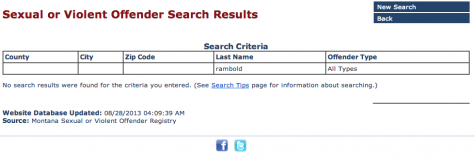I Want to Talk a Little Bit About Rape: Even the Less Rapey Rape
Earlier this week Stacey Rambold was sentenced to 30 days for the rape of a 14 year old girl who ultimately committed suicide. Rambold already had a sweetheart deal where he had avoided a felony rape conviction by entering into a sex-offender treatment program but after having unsupervised visits with minors and a sexual relationship with a woman he was kicked out of the program.
Stacey Rambold is not a success story but District Judge G. Todd Baugh in Montana defends the 30 day sentence (prosecutors recommended 10 years) by stating, “Obviously, a 14-year-old can’t consent. I think that people have in mind that this was some violent, forcible, horrible rape. It was horrible enough as it is just given her age, but it wasn’t this forcible beat-up rape.”
The victim’s mother issued a written statement: “As I looked on in disbelief, Judge Baugh stated that our teenage daughter was as much in control of the situation as her teacher was,” she wrote. “She wasn’t even old enough to get a driver’s license. But Judge Baugh, who never met our daughter, justified the paltry sentence saying she was older than her chronological age.”
I’m not a lawyer but I play one at the dinner table so let’s talk about what rape is. I think given that women like Whoopi Goldberg (and everyone who doesn’t spit in Roman Polanski’s eye) think some rape is not real rape and that some people have less value than others. Candy Crowley and Poppy Harlow were sad when rapists got caught… it interfered with their potential. It would seem that Judge Baugh demonstrated his belief that troubled teens are due less protection than “untroubled teens”.
I’m going to ask you to do something that you might find repulsive and I promise you that if you do this you will share my outrage and hopefully you will be compelled to take action, to talk about consent with your sons and with your daughters. You will hopefully talk to your children in candid and uncomfortable ways so that they feel empowered to talk back to adults in power, to not be alone with them and to know clearly and unequivocally what the boundaries are.
I want you to go look at a 14 year old child. Boy or girl it doesn’t matter. Now I want you to look at this man.

Does he have to punch her, tie her up or kidnap her? Is it enough to psychologically beat someone? We’re not talking about a 19 year old and a 17 year old, we’re talking about a middle aged man, a teacher, someone with a great deal of authority raping a 14 year old child.
Let’s talk about some of the things that children cannot do:
- Children cannot sign legally binding contracts
- Children cannot vote
- Children cannot consent to sex with adults
- Even if you’re their teacher
- Even if you’re their coach
- Even if you’re their priest
Let’s talk about what rape is and let’s make it specific to Montana from the state’s website here is the definition of “without consent.
45-5-501. Definitions. (1) (a) As used in 45-5-503, the term “without consent” means:
(i) the victim is compelled to submit by force against the victim or another; or
(ii) subject to subsections (1)(b) and (1)(c), the victim is incapable of consent because the victim is:
(A) mentally defective or incapacitated;
(B) physically helpless;
(C) overcome by deception, coercion, or surprise;
(D) less than 16 years old;
(E) incarcerated in an adult or juvenile correctional, detention, or treatment facility or is on probation or parole and the perpetrator is an employee, contractor, or volunteer of the supervising authority and has supervisory or disciplinary authority over the victim, unless the act is part of a lawful search;
(F) receiving services from a youth care facility, as defined in 52-2-602, and the perpetrator:
(I) has supervisory or disciplinary authority over the victim or is providing treatment to the victim; and
(II) is an employee, contractor, or volunteer of the youth care facility; or
(G) admitted to a mental health facility, as defined in 53-21-102, is admitted to a community-based facility or a residential facility, as those terms are defined in 53-20-102, or is receiving community-based services, as defined in 53-20-102, and the perpetrator:
(I) has supervisory or disciplinary authority over the victim or is providing treatment to the victim; and
(II) is an employee, contractor, or volunteer of the facility or community-based service.
(b) Subsection (1)(a)(ii)(E) does not apply if the individuals are married to each other and one of the individuals involved is on probation or parole and the other individual is a probation or parole officer of a supervising authority.
(c) Subsections (1)(a)(ii)(F) and (1)(a)(ii)(G) do not apply if the individuals are married to each other and one of the individuals involved is a patient in or resident of a facility, is a recipient of community-based services, or is receiving services from a youth care facility and the other individual is an employee, contractor, or volunteer of the facility or community-based service.
(2) As used in subsection (1), the term “force” means:
(a) the infliction, attempted infliction, or threatened infliction of bodily injury or the commission of a forcible felony by the offender; or
(b) the threat of substantial retaliatory action that causes the victim to reasonably believe that the offender has the ability to execute the threat.
(3) As used in 45-5-502 and this section, the following definitions apply:
(a) “Parole”:
(i) in the case of an adult offender, has the meaning provided in 46-1-202; and
(ii) in the case of a juvenile offender, means supervision of a youth released from a state youth correctional facility, as defined in 41-5-103, to the supervision of the department of corrections.
(b) “Probation” means:
(i) in the case of an adult offender, release without imprisonment of a defendant found guilty of a crime and subject to the supervision of a supervising authority; and
(ii) in the case of a juvenile offender, supervision of the juvenile by a youth court pursuant to Title 41, chapter 5.
(c) “Supervising authority” includes a court, including a youth court, a county, or the department of corrections.
I want to note that in addition to children under 16 you also can’t make prisoners have sex with you. That’s also rape, it’s the rape that people are going to wish on Stacey Rambold. Don’t be the person that wishes it upon another.
I am begging everyone to talk about this in your homes. Kids are off to college and the statistics around sexual assault on campuses are grim. Use this as a teachable moment for your sons and for your daughters. Let’s skip the term slutty and just acknowledge that some people want to be very sexy. Let’s tell our sons that the only way they should ever have sex is when everyone consents. Let’s remind them that to consent you need to be an adult or of similar age, that you need to be sober and that no one can be indebted to the other.
Let’s tell our daughters that if they succumb to an older man (a teacher, a coach, a neighbor, a boss) that we won’t judge them. That we won’t think they’re sluts, we won’t look at them differently. Let’s change the conversation and when our kids talk about the kids who are promiscuous we don’t give a side eye or pass judgement. We keep the conversation open so that the Stacey Rambolds of the world have less opportunity.
Let’s note that the Megans Law site in Montana does not have Rambold listed as a sex offender as of today, possibly because he’s serving his brief sentence.

If you are outraged, and I don’t know how you could not be, please sign this petition. Judge Baugh could have chosen something between 30 days and 10 years. A 30 day sentence makes it unsafe to be a woman in Montana.